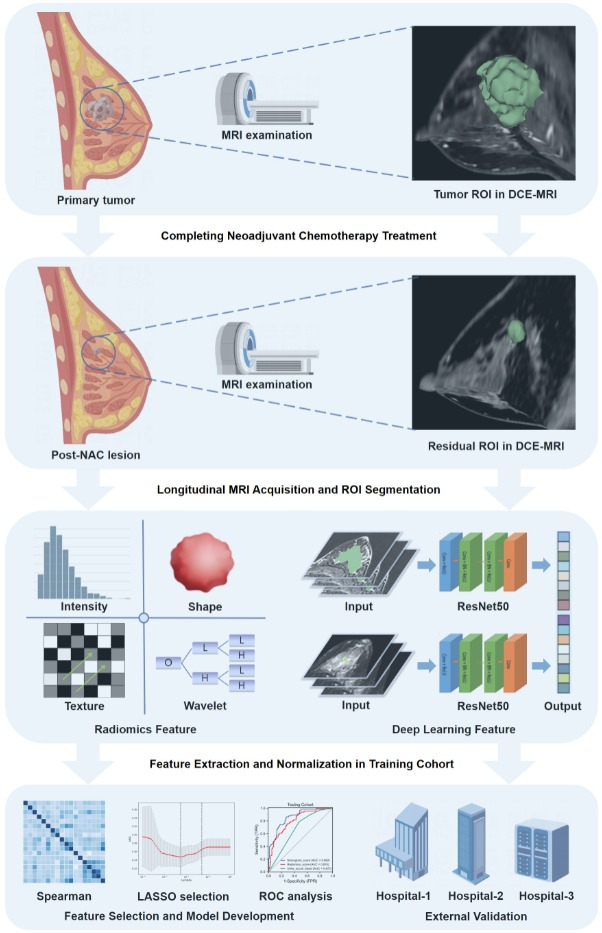

Recently, under the leadership of Prof. Wang Kun from the Department of Breast Cancer of our hospital, the latest research achievement titled “Longitudinal MRI-based Fusion Novel Model Predicts Pathological Complete Response in Breast Cancer Treated with Neoadjuvant Chemotherapy: A Multicenter, Retrospective Study” was published in eClinicalMedicine, a sub-journal of Lancet in Britain (top in CAS Q1, impact factor: 17.03) in collaboration with the First Affiliated Hospital of Sun Yat-sen University, the First People’s Hospital of Foshan, and Shantou Central Hospital. The first author of the article is Huang Yuhong, a postdoctoral fellow in Prof. Wang Kun’s team. The first author and the corresponding author are from Guangdong Provincial People’s Hospital. This study is another outstanding scientific research achievement of the Department of Breast Cancer under the strong support of our hospital’s Peaking Program.
According to the latest international diagnosis and treatment guidelines for breast cancer, neoadjuvant chemotherapy has become the standard preoperative therapy for locally advanced breast cancer. Neoadjuvant chemotherapy can realize tumor down-staging and make inoperable breast cancer meet the surgical conditions; in particular, the realization of pathological complete response (pCR) enables patients to avoid surgery and improve their postoperative quality of life. However, pCR can only be achieved through postoperative gross pathological assessment, and there is an urgent need to develop tools for the noninvasive and accurate preoperative prediction of the efficacy of neoadjuvant chemotherapy. Prof. Wang Kun’s team from the Department of Breast Cancer carried out an AI in-depth radiomic study with breast magnetic resonance imaging being the entry point, and built a number of machine learning models for different molecular subtypes of breast cancer using big data of temporal dynamic magnetic resonance imaging, which can accurately predict preoperative pCR in breast cancer and achieve good prediction performance, thereby helping to formulate surgical schemes for breast cancer after neoadjuvant chemotherapy, and also realize the more individualized hierarchical surgical management of patients.
Compared to past studies, considering the great heterogeneity of different subtypes of breast cancer when developing the AI model, Prof. Wang Kun’s team built and optimized models for different subtypes of breast cancer innovatively, and as a result, the more refined models achieved good prediction performance for each subtype. In addition, most of past studies only focus on a single time node, while Prof. Wang Kun considered that foci of breast cancer would change significantly after neoadjuvant chemotherapy, so this study combined MRI images before and after neoadjuvant chemotherapy, and applied the multimodal technology of deep learning and radiomics to further optimize the AI model, realizing the accurate modeling of temporal dynamic MRI images to predict pCR in breast cancer for the first time in the world.

In terms of clinical application, Prof. Wang Kun’s team relies on the clinical practice of neoadjuvant chemotherapy for breast cancer, and the image data collected also comes from patients’ routine magnetic resonance examinations during neoadjuvant chemotherapy. After the in-depth mining of image data, the developed AI model can realize the noninvasive and accurate preoperative prediction of pCR in breast cancer, so that breast cancer patients can benefit from more accurate medical decisions with no additional expenses. For breast physicians, this model is easy to operate, as it is only necessary to enter the magnetic resonance images before and after neoadjuvant chemotherapy into the automated model along with the focus to obtain a prediction score for further comprehensive evaluation by the physician to develop the best surgical scheme for the patient. In the future, Prof. Wang Kun’s team will further optimize the AI model and try to extend it to more areas, so that more breast cancer patients can benefit from precision medicine.
The team from the Department of Breast Cancer, Guangdong Provincial People’s Hospital has made excellent achievements in scientific research and clinical practice with the strong support of hospital policies by sticking to our guideline of comprehensive development of medicine, teaching, and research. Prof. Wang Kun’s team has carried out a series of basic, translational, and clinical studies in the field of breast cancer treatment based on clinical practice. Since 2019, the team from the Department of Breast Cancer has applied for five projects under the National Natural Science Foundation of China and four projects under the Guangdong Natural Science Foundation, and published four high-level SCI articles with a score of over 10 points as the first author, with the impact factors of the SCI articles published totaling over 100 points. For breast cancer patients receiving neoadjuvant chemotherapy, the team is committed to improving the efficacy of neoadjuvant chemotherapy, and also paying constant attention to possible toxic and side effects of patients during treatment, monitoring treatment responses timely, and developing optimal surgical schemes for patients where possible to improve their postoperative quality of life. In the future, the team from the Department of Breast Cancer will stay true to its original aspiration, keep forging ahead toward the goal of building a world-class hospital, and also bring warmth to breast cancer patients with optimal therapeutic schemes.
Huang Yuhong
Updated: April 7, 2023